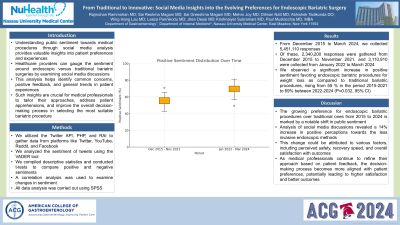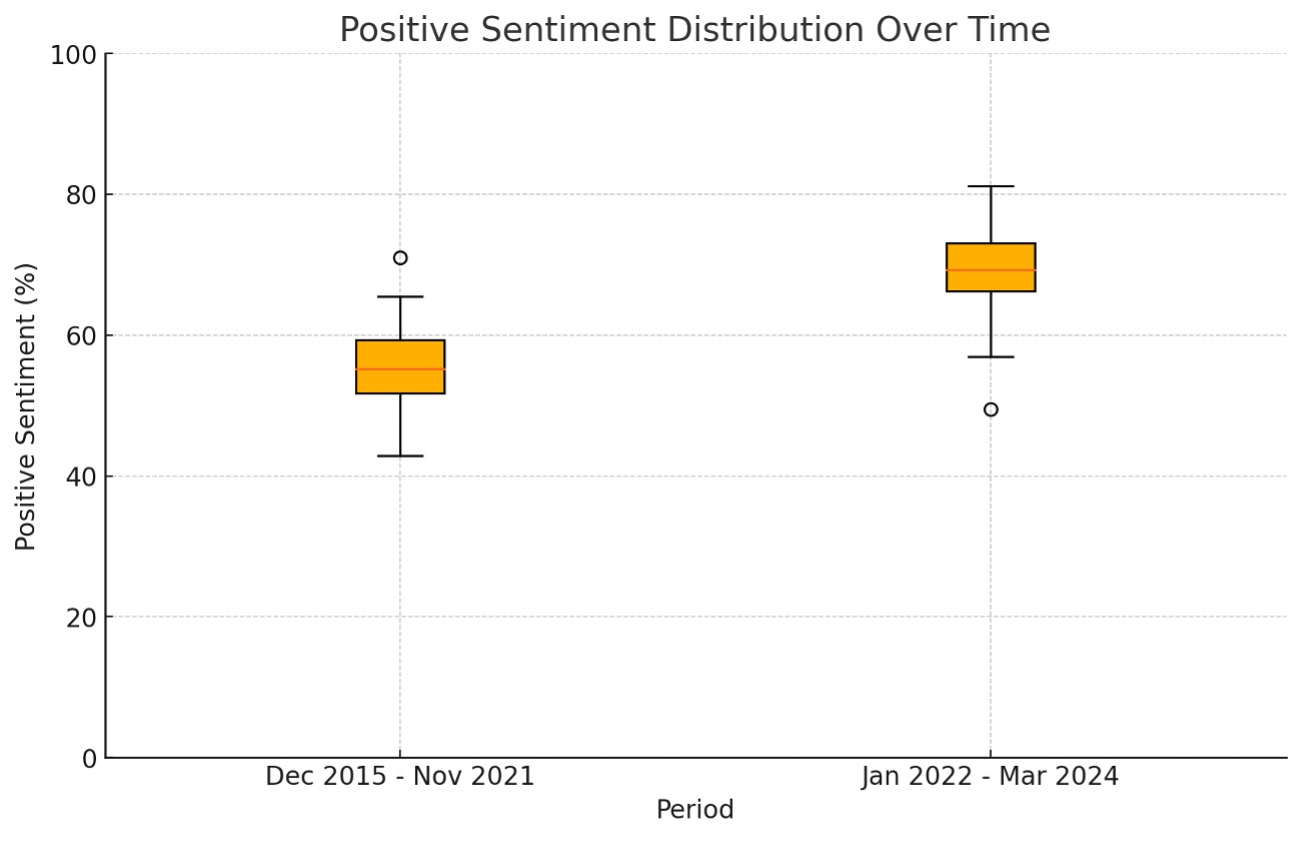Sunday Poster Session
Category: Obesity
P1440 - From Traditional to Innovative: Social Media Insights Into the Evolving Preferences for Endoscopic Bariatric Surgery
Sunday, October 27, 2024
3:30 PM - 7:00 PM ET
Location: Exhibit Hall E

- RR
Rajmohan Rammohan, MD
Nassau University Medical Center
East Meadow, NY
Presenting Author(s)
Raj Mohan Ram Mohan, MD, Sai Reshma Magam, MD, Sai Greeshma Magam, MD, Melvin Joy, MD, Dilman Natt, MD, Abhishek Tadikonda, MD, Winghang Lau, MD, Leeza Pannikodu, MD, Jiten Desai, MD, Paul Mustacchia, MD, MBA
Nassau University Medical Center, East Meadow, NY
Introduction: Understanding public sentiment towards medical procedures through social media analysis provides valuable insights into patient preferences and experiences. Healthcare providers can gauge the sentiment around endoscopic versus traditional bariatric surgeries by examining social media discussions. This analysis helps identify common concerns, positive feedback, and general trends in patient experiences. Such insights are crucial for medical professionals to tailor their approaches, address patient apprehensions, and improve the overall decision-making process in selecting the most suitable bariatric procedure.
Methods: We utilized the Twitter API, PHP, and RAI to gather data from platforms like Twitter, YouTube, Reddit, and Facebook. We analyzed the sentiment of tweets using the VADER tool. We compiled descriptive statistics and conducted t-tests to compare positive and negative sentiments. A correlation analysis was used to examine changes in sentiment. All data analysis was carried out using SPSS
Results: From December 2015 to March 2024, we collected 5,451,110 responses. Of these, 2,340,200 responses were gathered from December 2015 to November 2021, and 3,110,910 were collected from January 2022 to March 2024. We observed a significant increase in positive sentiment favoring endoscopic bariatric procedures for weight loss as compared to traditional bariatric procedures, rising from 55 % in the period 2015-2021 to 69% between 2022-2024 (P=0.032, 95% CI)
Discussion: The growing preference for endoscopic bariatric procedures over traditional ones from 2015 to 2024 is marked by a notable shift in public sentiment. Analysis of social media discussions revealed a 14% increase in positive perceptions towards the less invasive endoscopic methods. This change could be attributed to various factors, including perceived safety, recovery speed, and overall satisfaction with outcomes. As medical professionals continue to refine their approach based on patient feedback, the decision-making process becomes more aligned with patient preferences, potentially leading to higher satisfaction and better outcomes.

Disclosures:
Raj Mohan Ram Mohan, MD, Sai Reshma Magam, MD, Sai Greeshma Magam, MD, Melvin Joy, MD, Dilman Natt, MD, Abhishek Tadikonda, MD, Winghang Lau, MD, Leeza Pannikodu, MD, Jiten Desai, MD, Paul Mustacchia, MD, MBA. P1440 - From Traditional to Innovative: Social Media Insights Into the Evolving Preferences for Endoscopic Bariatric Surgery, ACG 2024 Annual Scientific Meeting Abstracts. Philadelphia, PA: American College of Gastroenterology.
Nassau University Medical Center, East Meadow, NY
Introduction: Understanding public sentiment towards medical procedures through social media analysis provides valuable insights into patient preferences and experiences. Healthcare providers can gauge the sentiment around endoscopic versus traditional bariatric surgeries by examining social media discussions. This analysis helps identify common concerns, positive feedback, and general trends in patient experiences. Such insights are crucial for medical professionals to tailor their approaches, address patient apprehensions, and improve the overall decision-making process in selecting the most suitable bariatric procedure.
Methods: We utilized the Twitter API, PHP, and RAI to gather data from platforms like Twitter, YouTube, Reddit, and Facebook. We analyzed the sentiment of tweets using the VADER tool. We compiled descriptive statistics and conducted t-tests to compare positive and negative sentiments. A correlation analysis was used to examine changes in sentiment. All data analysis was carried out using SPSS
Results: From December 2015 to March 2024, we collected 5,451,110 responses. Of these, 2,340,200 responses were gathered from December 2015 to November 2021, and 3,110,910 were collected from January 2022 to March 2024. We observed a significant increase in positive sentiment favoring endoscopic bariatric procedures for weight loss as compared to traditional bariatric procedures, rising from 55 % in the period 2015-2021 to 69% between 2022-2024 (P=0.032, 95% CI)
Discussion: The growing preference for endoscopic bariatric procedures over traditional ones from 2015 to 2024 is marked by a notable shift in public sentiment. Analysis of social media discussions revealed a 14% increase in positive perceptions towards the less invasive endoscopic methods. This change could be attributed to various factors, including perceived safety, recovery speed, and overall satisfaction with outcomes. As medical professionals continue to refine their approach based on patient feedback, the decision-making process becomes more aligned with patient preferences, potentially leading to higher satisfaction and better outcomes.

Figure: Patient sentiment analysis over time
Disclosures:
Raj Mohan Ram Mohan indicated no relevant financial relationships.
Sai Reshma Magam indicated no relevant financial relationships.
Sai Greeshma Magam indicated no relevant financial relationships.
Melvin Joy indicated no relevant financial relationships.
Dilman Natt indicated no relevant financial relationships.
Abhishek Tadikonda indicated no relevant financial relationships.
Winghang Lau indicated no relevant financial relationships.
Leeza Pannikodu indicated no relevant financial relationships.
Jiten Desai indicated no relevant financial relationships.
Paul Mustacchia indicated no relevant financial relationships.
Raj Mohan Ram Mohan, MD, Sai Reshma Magam, MD, Sai Greeshma Magam, MD, Melvin Joy, MD, Dilman Natt, MD, Abhishek Tadikonda, MD, Winghang Lau, MD, Leeza Pannikodu, MD, Jiten Desai, MD, Paul Mustacchia, MD, MBA. P1440 - From Traditional to Innovative: Social Media Insights Into the Evolving Preferences for Endoscopic Bariatric Surgery, ACG 2024 Annual Scientific Meeting Abstracts. Philadelphia, PA: American College of Gastroenterology.
